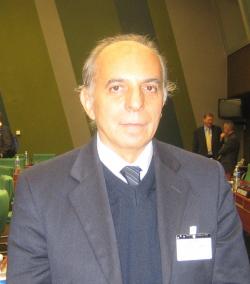Interview of the new president of the CEPEJ
At the term of the 8th pleanary meeting of the CEPEJ in Strasburg on 9th December 2006, Mr Fausto de Santis, the new preisdent of the CEPEJ, gave an interview to the UIHJ.
Fausto de Santis, the new president of the CEPEJ
Mr. Fausto de Santis, you have just been elected president of the CEPEJ for the years 2007 and 2008. We congratulate you for this nomination and wish you all the best for your mandate. What are your impressions?
First of all, I would like to pay homage to the impressive work achieved by my predecessor, Eberhard Desch. Mr. Desch had the very delicate mission of giving life to the CEPEJ and of legitimating his existence, which he made a success beyond all hopes. The positive reactions to our work showed that the CEPEJ is now recognised like an essential body of the Council of Europe.
Concerning my nomination, I am personally very grateful of the confidence which was granted to me. For that, the new board of the CEPEJ which I chair as from 1st January, 2007 will attempt to continue the actions undertaken by the preceding bureau. And to have worked with the CEPEJ since its creation in 2002, I know that each one is very inclined to develop and reinforce even more our commission.
Which are your objectives for the next years?
By creating the CEPEJ under the impulse of the European ministers, the Committee of the Ministers of the Council of Europe wanted a structure able to propose concrete solutions to improve equity, the quality and the efficiency of justice in Europe, to reinforce the confidence of citizens in their national system and to limit the recourse to the Court of Strasbourg, motivated by the dysfunctions of justice and which are in contradiction with article 6 of the European Convention on human rights. The report on the “European legal systems - Edition 2006” was recently presented by Mr. Desch during the 974th meeting of the representatives of the ministers. It was regarded as the first and fundamental stage of the process for the improvement of the legal systems.
All those who work in the field of the statistics know well that the quality of the data is very important for any analysis and evaluation. The working group in charge of evaluation (GT-EVAL) wants to improve the quality of the answers by setting out objectives to obtain homogeneous and common data in the most important sectors of the legal system within the framework of a harmonization of those who produce the national statistics.
Among our ambitions in this field, we want to achieve the following goals:
- to carry out a summary of the cases of each country as regards article 6 of the European Convention on human rights
- to determine the critical sectors in the field of justice of each States where it would be important to allocate economic resources
- to join together the States by homogeneous groups and to produce common indicators of performance
- to analyse the criminal policy and the role of the prosecutors
- to analyse in detail the answers which were made to us on various points.
In addition, the GT-EVAL proposes to open its data base and research to teams of researchers who would wish to look further into the analysis of the results of the report. It is also proposed to harmonise its work with that of the other authorities of the Council of Europe (the advisory Council of the European judges, advisory Council of the European prosecutors, the Lisbon network to harmonise the training of the judges and the prosecutors).
I only gave you one outline of what we want to carry out for the next years through the example of this working group.
How the occupation of judicial officers can fall under the work of the CEPEJ?
One knows the very important role of judicial officers in the effectiveness of justice and the poly-functionality of his mission and his activities. The judicial officer is an essential wheel of the administration of justice. The CEPEJ is in close relation with the UIHJ, as shows its regular participation in your work, the last one being your international conference in Washington in May 2006 and the closing seminar of the Tacis project on the efficiency of Justice in Baku, in Azerbaijan, at the end of November 2006. We really appreciate your actions in favour of the development of the occupation of judicial officers. Your - very ambitious - project to set up a world code of enforcement is very interesting and we will not fail to follow the advance of your work. For all these reasons, we always wish for a closer cooperation between the CEPEJ and the UIHJ.
Thank you Mr. President and all the best for your mandate!
Thank you.


